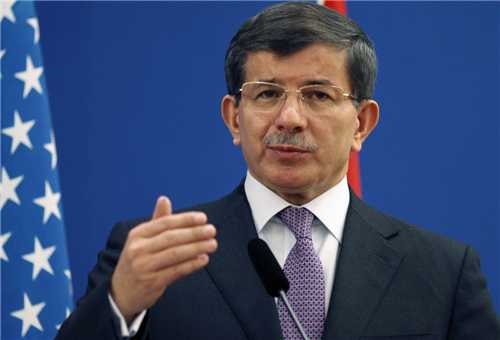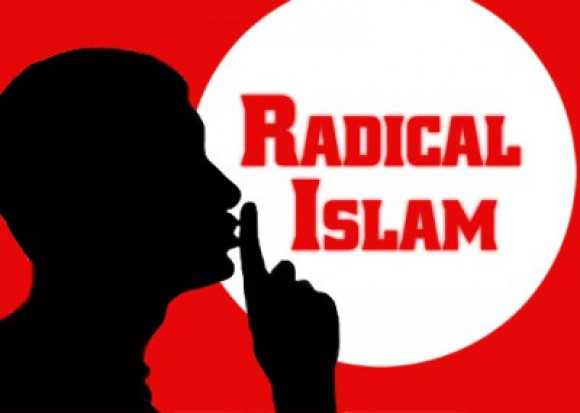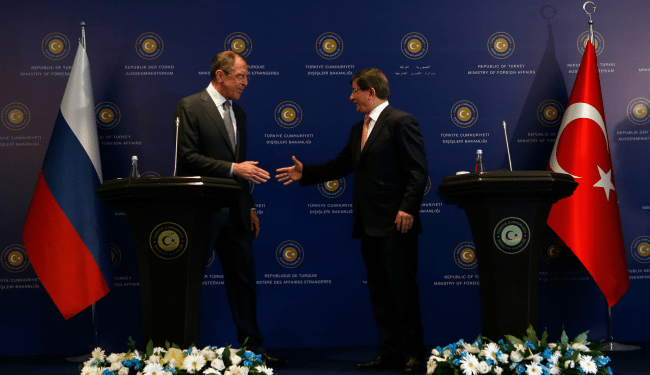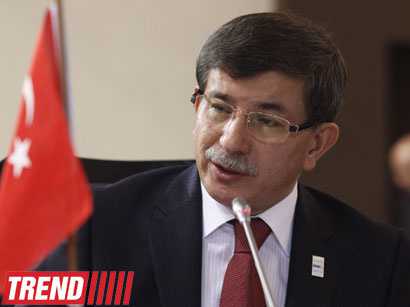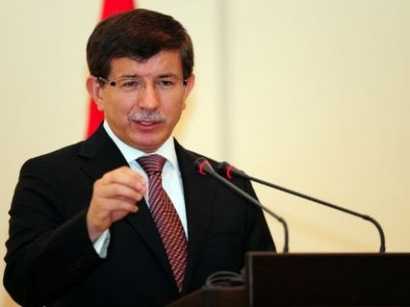Turkish FM denies involvement in strike on Syrian airbase attributed to Jerusalem, says Ankara’s ‘issues’ with Damascus are ‘based on principle’BY TIMES OF ISRAEL STAFF November 2, 2013, 12:21
Turkish Foreign Minister Ahmet Davutoglu (right) with Iran’s Foreign Minister Mohammad Javad Zarif, in Istanbul, Turkey, Friday, Nov. 1, 2013. (photo credit: AP Photo)NEWSROOM
Israel ‘furious’ with White House for leak on Syria strikeADL chief: US seen as ‘weak and retreating’ on world stage‘Israel doesn’t expect Assad to respond to attack’‘Turkey behind strike on Latakia airbase in Syria’US official: Israel hit Hezbollah-bound missiles in SyriaSyria completes destruction of chemical arms equipment Claire Danes to host Nobel Peace Prize concertSaudi resolution slams Syria’s human rights recordHuge explosion reported at Syrian air defense baseSyrian base targeted in blast may have housed advanced missiles
Turkey on Saturday denied reports of its involvement in an alleged Israeli air strike on a military base in Latakia, Syria on Wednesday, which allegedly targeted “missiles and related equipment” meant for Lebanese terror group Hezbollah.
Turkish Foreign Minister Agmet Davutoglu said Saturday: “There is an attempt to give the impression that Turkey has coordinated with Israel. We have issues with Syria, an issue based on a principle. But let me say it clearly: The Turkish government has never cooperated with Israel against any Muslim country, and it never will.”
Davutoglu was speaking at a joint press conference with Iranian Foreign Minister Mohammed Zarif Saturday in Istanbul.
The Turkish FM slammed the reports, describing them as “black propaganda.” “Those [reports] are attempts to cast a shadow on the Syrian people’s rightful struggle and Turkey’s attitude with principles. It is out of the question for us to participate in any common operation,” he was quoted by Turkish daily Hurriyet as saying.
On Thursday, a report by Lebanon’s MTV Thursday cited Turkey as being behind the Wednesday attack in Syria, but subsequent reports claimed Turkey merely supplied intelligence to Israel. The Lebanese report cited Israeli officials who allegedly claimed Turkish involvement came in response to the June 2012 interception of a Turkish jet, which Syrian forces shot down. The pilots were subsequently killed.
On Thursday, an Obama administration official told CNN it was Israeli warplanes that attacked the airbase in Latakia. An American security official told AP that the attack occurred in the Syrian port city of Latakia and that the target was Russian-made SA-125 missiles.
The Israeli government and military establishment have declined to comment, and on Friday it was reported that the government reacted with fury at the leak by the Americans.
On Thursday, one Israeli official told Reuters he thought Israel had carried out the strike, but wasn’t certain. Israel has repeatedly warned that any attempt to transfer to Hezbollah chemical or other game-changing weapons would constitute a “red line” and precipitate military action.
Earlier Thursday, on the heels of reports that the airbase had contained advanced, Russian-made, anti-aircraft missiles, al-Arabiya reported that Israel had attacked not one, but two targets in the civil war-torn country.
Al-Arabiya’s report said two targets had been hit in Syria on Wednesday night — not just the Latakia air defense base, but a target in Damascus as well. Both targets were said to have contained shipments of Russian SA-8 anti-aircraft missiles meant for Hezbollah, which were reportedly completely destroyed.
A map of the Latakia airbase posted online shows three batteries of the Russian-made surface-to-air anti-aircraft missile at the base, outside Snobar Jableh in the country’s coastal Latakia region.
Al-Arabiya quoted opposition forces as saying the base held S-125 missiles.
The S-125 is especially effective against maneuverable low- to medium-altitude targets, including aircraft. The Egyptians used such missiles with some success during the War of Attrition and the 1973 Yom Kippur War, and batteries used by Iraq may have knocked down coalition aircraft in the First Gulf War.
The system has undergone improvements since then, but countermeasures have also progressed significantly.
A massive explosion was reported at the base late Wednesday night, with some reports that it was targeted by missiles fired from the sea. The Syrian news outlet Dam Press, considered loyal to the regime of Bashar Assad, reported that the site was damaged but that there had been no injuries.
Earlier on Wednesday, the Lebanese government news agency reported six Israeli aircraft flying through Lebanese airspace along the coast north of Beirut.
The coastal strip of Syria, encompassing the cities of Tartous, Latakia and Baniyas, is part of a predominantly Alawite portion of the country, which remains loyal to the Assad regime in its lengthy campaign against rebels.
Israel has been accused of striking Syrian sites in the past, including in January and May this year. Israel refused to confirm the reports that it targeted weapons transfers, possibly to Hezbollah, which has remained loyal to Assad during the country’s bloody civil war.
Syria is reportedly in the midst of upgrading its missile-defense system to the Russian-made S-300, a move Israel has lobbied against.
The Associated Press contributed to this report.
via Davutoglu: Turkey will never cooperate with Israel against a Muslim country | The Times of Israel.

